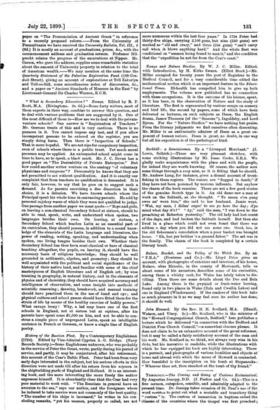"What is Secondary Education ? " Essays. Edited by R.
P. Scott, M.A. (Rivingtons. 2s. 43d.)—Some forty writers, most of them experts in their way, combine to answer this question, and to deal with various problems that are suggested by it. One of the most difficult of these is—How are we to deal with the private- venture schools ? One answer is " Registration of Teachers." Mr. Gerrans treats of this and is very cautious. There is no panacea in it. You cannot impose any test, and if you allow incompetent persons to be entered on the register, you are simply doing harm. Then there is "Inspection of Schools." That is more hopeful. We are not ripe for compulsory inspection, even of schools where there is a public trust. Yet much moral pressure may be applied. An uninspected school might come in time to have, so to speak, a black mark. Mr. J. C. Bevan has a good paper on "The Desirability of Private Enterprise." But how could another writer venture on the analogy "of voluntary physicians and surgeons"? Presumably he knows that they are not permitted to act without qualification. And it is exactly our complaint that from teachers no qualification is demanded. It is only fair, however, to say that he goes on to suggest such a demand. As for parents exercising a due discretion in their choice, it is a delusion. We have known schools where the Principal spent his whole time in canvassing parents. He sold by personal cajolery wares of which they were not qualified to judge. One passage from another paper we must quote:—" Boys and girls, on leaving a non-classical Secondary School at sixteen, should be able to read, speak, write, and understand when spoken, two languages besides their own. On leaving, at sixteen, a Secondary School which teaches Latin as an essential part of its curriculum, they should possess, in addition to a sound know- ledge of the elements of the Latin language and literature, the power of reading, writing, speaking, and understanding when spoken, one living tongue besides their own. Whether their Secondary School has thus been semi-classical or bare of classical teaching altogether, the pupils, on leaving it, should have the necessary basis of religious knowledge ; they should be well grounded in arithmetic, algebra, and geometry ; they should be well acquainted with the political and social significance of the history of their native land, and familiar with some of the chief masterpieces of English literature and of English art ; by wise training in geography, in natural history, and in the elements of physics and of chemistry, they should have acquired accuracy and intelligence of observation, and some insight into methods of scientific reasoning ; drawing, brushwork, and manual training should have practised them in the use of hand and eye ; and physical culture and school games should have fitted them for the strain of life by means of the healthy exercise of bodily powers." What savage irony ! Why, a lad may leave one of the first schools in England, not at sixteen but at eighteen, after his parents have spent some 21,500 on him, and not be able to con- strue a simple piece of unprepared Latin, speak an intelligible sentence in French or German, or know a single line of English poetry.


































 Previous page
Previous page